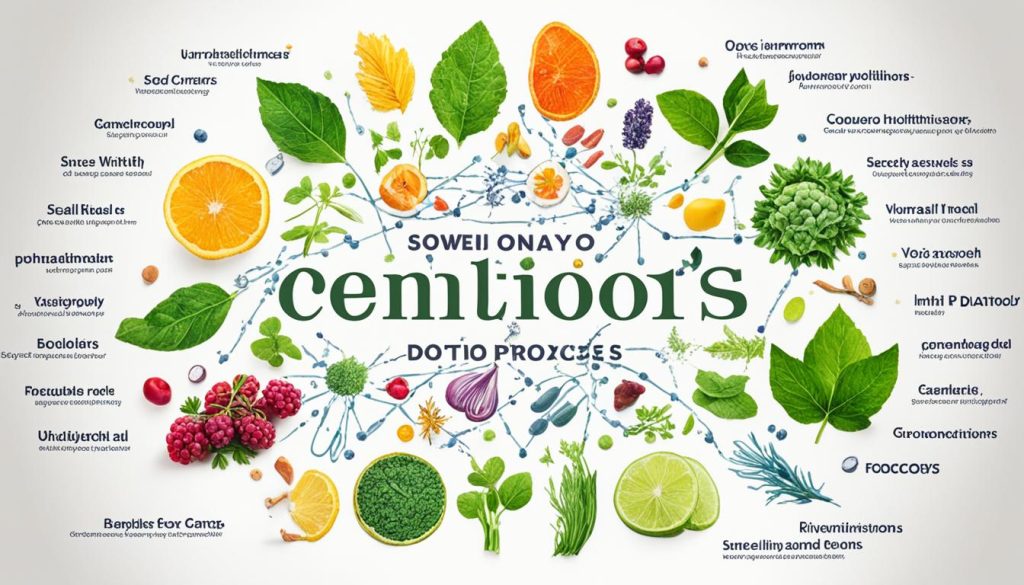Detox diets have gained immense popularity in the health and wellness industry, promising to rid your body of toxins and enhance your overall well-being. However, it is crucial to understand the truth behind these diets and the scientific evidence supporting their effectiveness.
Experts, such as Edzard Ernst, an emeritus professor of complementary medicine, have raised concerns about the validity of detoxing. According to Ernst, detoxing is often a marketing scam created by entrepreneurs to sell products, lacking any concrete evidence to support its claims. There are two types of detox: one used in medical treatments for drug addiction, and the other is a pseudoscientific concept without any foundation in evidence.
The idea that toxins accumulate in the body and can be flushed out through detox treatments is unsupported. Our bodies already have natural detoxification mechanisms in place, including organs like the kidneys, liver, and skin, which efficiently eliminate waste and toxins. Detox diets often lead to weight loss, but this is primarily due to calorie restriction rather than the elimination of toxins.
Scientific challenges have been made against detox products and treatments, as manufacturers fail to define the meaning of detoxification or identify the specific toxins they claim to remove. Consequently, their claims lack credibility and scientific backing.
Key Takeaways:
- Detox diets lack scientific evidence to support their effectiveness.
- The human body has natural detoxification mechanisms and does not require external detox treatments.
- Claims made by detox products and treatments are often unsubstantiated.
- Weight loss from detox diets is primarily due to calorie restriction.
- Focus on maintaining a healthy, balanced lifestyle rather than relying on extreme detox measures.
What Are Detox Diets and Toxins?
Detox diets, although lacking a strict definition, typically involve various methods such as low-calorie intake, juice fasting, elimination of certain foods, or the use of laxatives. These diets claim to cleanse the body of toxins and promote health and vitality. However, the concept of toxins itself is not well-defined. Toxins can encompass a wide range of substances, including pollutants, chemicals, molds, allergens, and naturally occurring compounds found in plants, animals, and food.
The harm or benefit of these substances depends on the dose. Some toxins can indeed be harmful to our health, while others are essential for certain bodily functions. It is important to note that the human body has evolved complex systems and organs to handle and eliminate these substances naturally. The liver detoxifies harmful compounds, the kidneys filter waste products, the lungs expel gases, and the digestive system eliminates waste through feces.
Scientific evidence supporting the effectiveness of detox diets in purifying the body of toxins is limited. Conducting rigorous research on these diets is challenging due to their varying lengths and requirements, as well as the intricacies of human physiology. Moreover, the claims made by detox diets often exaggerate their benefits and rely on quick fixes rather than sustainable, long-term solutions for improving health.
It is important to approach detox diets with caution, critically evaluating their claims and understanding that the body’s natural detoxification processes are already in place. Instead of depending on extreme dietary measures, focusing on a balanced, nutrient-rich diet, proper hydration, regular exercise, and a healthy lifestyle can better support the body’s natural ability to eliminate waste and maintain overall well-being.
The Complexity of Defining Toxins
The diverse nature of toxins makes it challenging to provide a concise definition. Toxins can be classified into different categories:
- Pollutants: These are substances present in the environment, such as air pollutants, heavy metals, pesticides, and industrial chemicals. They can enter our bodies through inhalation, ingestion, or direct contact.
- Chemicals: Chemical toxins can be artificial or naturally occurring. They include substances like synthetic drugs, solvents, cleaning agents, and naturally produced toxins in certain plants and animals.
- Molds: Mold toxins, known as mycotoxins, are produced by certain types of fungi. They can be found in damp or poorly ventilated environments and can cause health problems when ingested or inhaled.
- Allergens: Allergenic substances provoke immune responses in susceptible individuals, leading to allergic reactions. Common allergens include pollen, dust mites, animal dander, and certain foods.
- Naturally occurring substances: Some naturally occurring compounds, such as alkaloids, can have toxic effects if consumed in excessive amounts. Examples include caffeine, nicotine, and certain plant toxins.
It is essential to consider the specific context and dose when discussing toxins. While certain toxins can pose risks to human health, our bodies have evolved to handle and eliminate them through natural detoxification processes.
The Ineffectiveness of Detox Diets
“Detox diets often promise a quick fix for health concerns, but their efficacy is questionable. Instead of focusing on extreme measures, a holistic approach to health is more beneficial in the long run.” – Dr. Jane Smith, Nutrition Expert
Detox diets have gained popularity in recent years, partly due to their promises of quick and dramatic results. However, the effectiveness of these diets in purifying the body of toxins is not supported by scientific evidence. The body’s natural detoxification processes, including those performed by the liver, kidneys, and other organs, are already designed to eliminate waste and maintain optimal health.
Throughout history, human beings have survived and thrived without the need for detox diets or supplements. The effectiveness of these diets is often exaggerated, with claims that they can remove specific toxins or cleanse the body on a cellular level. However, these claims lack scientific backing and can be misleading.
The uniqueness of each individual’s physiology, the complexity of detoxification processes, and the wide range of toxins make it difficult to develop a standardized approach to detoxing. Additionally, detox diets can be restrictive, leading to nutrient deficiencies and potential health risks.
Rather than relying on detox diets, adopting a balanced and sustainable approach to nutrition and lifestyle is key to long-term health. A diverse, plant-based diet, regular physical activity, adequate hydration, and stress management contribute to overall well-being and support the body’s natural detoxification processes.
In conclusion, while the concept of detox diets and toxins may seem appealing, it is important to approach them with critical thinking and a scientific perspective. The body’s natural detoxification processes are well-equipped to handle toxins, and extreme dieting measures may do more harm than good. Emphasizing a healthy, balanced lifestyle is the best approach to optimizing our body’s innate ability to eliminate waste and maintain optimal health.
The Downside of Detoxing
Detox diets can pose significant risks to your health and well-being. While these diets may promise quick results, they often have harmful effects on your body. These extreme and restrictive diets can be challenging to follow long-term, leading to various negative consequences.
Risks of Detox Diets:
- Inadequate nutrition: Detox diets often eliminate entire food groups or restrict calorie intake, resulting in inadequate nutrition for your body’s needs. This can lead to nutrient deficiencies and imbalances.
- Low success rates: Dieting, in general, has low long-term success rates, and detox diets are even more challenging to sustain. The extreme nature of these diets makes them difficult to follow for an extended period.
- Disordered eating patterns: Long-term engagement with detox diets can contribute to the development of disordered eating behaviors. These patterns disrupt the body’s natural balance and can have severe consequences for both physical and mental health.
- Electrolyte imbalances: Some detox diets promote the use of laxatives or diuretics, which can lead to electrolyte imbalances. These imbalances can disrupt the optimal functioning of various bodily systems.
“Detox diets often eliminate entire food groups or restrict calorie intake, resulting in inadequate nutrition for your body’s needs.”
Harmful Effects of Detoxing:
- Fatigue: The restrictive nature of detox diets can leave you feeling tired and depleted, as your body lacks the necessary nutrients and energy sources.
- Headaches: Detox diets may trigger headaches due to sudden changes in blood sugar levels and dehydration.
- Nausea: Some detox diets can cause nausea and digestive discomfort as your body adjusts to the restricted food choices.
- Insomnia: The elimination of certain foods and changes in eating patterns can disrupt sleep schedules and result in insomnia.
- Anxiety and shakiness: Drastic changes in calorie intake and nutrient deficiencies can contribute to feelings of anxiety and physical shakiness.
It’s important to note that these side effects are not the result of toxins leaving the body. Instead, they are primarily caused by inadequate nutrition, low blood sugar, and imbalanced eating patterns. Long-term reliance on detox diets can have serious health implications and should be avoided.
It’s recommended to focus on establishing healthy habits such as following a balanced diet, engaging in regular exercise, and maintaining adequate hydration. These sustainable practices support your body’s natural detoxification processes without subjecting it to extreme measures.
Here is an example of a table comparing the risks and harmful effects of detox diets:
| Risks of Detox Diets | Harmful Effects of Detoxing |
|---|---|
| Inadequate nutrition | Fatigue |
| Low success rates | Headaches |
| Disordered eating patterns | Nausea |
| Electrolyte imbalances | Insomnia |

Why Detoxing is Unnecessary
Our bodies are equipped with natural detoxification processes that eliminate toxins through various organs and systems. The liver, kidneys, gastrointestinal system, skin, and lungs work synergistically to remove waste and unwanted substances. The liver breaks down harmful substances, the kidneys excrete waste products, the lungs expel carbon dioxide and other gases, and the digestive system eliminates waste through feces. These processes occur continuously and efficiently in a healthy body.
Detoxing is unnecessary because our bodies are already designed to perform these functions effectively. There is no scientific evidence to support the need for detox diets or supplements to aid in the body’s natural detoxification processes. Instead, focusing on a diverse, plant-based diet, staying properly hydrated, and maintaining a balanced lifestyle will support and optimize your body’s innate ability to detoxify itself.
| Organs/Systems | Functions |
|---|---|
| Liver | Breaks down harmful substances |
| Kidneys | Excretes waste products |
| Gastrointestinal System | Eliminates waste through feces |
| Skin | Assists in eliminating toxins |
| Lungs | Expels carbon dioxide and other gases |
To support your body’s natural detoxification processes, prioritize a balanced lifestyle that includes:
- Eating a diverse, plant-based diet rich in fruits, vegetables, whole grains, lean proteins, and low-fat dairy.
- Staying properly hydrated by drinking an adequate amount of water and incorporating hydrating foods like fruits and vegetables into your daily routine.
- Maintaining regular physical activity and exercise to promote overall well-being.
- Getting enough quality sleep to allow your body to rest, recover, and rejuvenate.
- Practicing stress management techniques such as meditation, deep breathing exercises, or engaging in activities you enjoy.
By focusing on these healthy habits, you can optimize your body’s natural detoxification processes and promote long-term wellness.

Best Ways to Support Your Body
While there is no need for extreme detox diets, there are certain foods and habits that can support your body’s natural detoxification processes. By incorporating these healthy habits into your lifestyle, you can optimize your body’s ability to remove toxins and maintain overall well-being.
1. Diverse, Plant-Based Diet
An essential step in supporting your body’s detoxification is consuming a diverse, plant-based diet. This means incorporating a variety of fruits, vegetables, whole grains, lean proteins, and low-fat dairy products into your meals. These nutrient-rich foods provide essential vitamins, minerals, and antioxidants that aid in detoxification processes.
2. Hydration
Proper hydration is crucial for supporting your liver and kidneys, which are responsible for eliminating toxins from your body. Drink an adequate amount of water throughout the day and include hydrating foods like fruits and vegetables, which have high water content.
3. High Fiber Intake
Increase your fiber intake to improve gut health and aid in the elimination of waste. Include fiber-rich foods such as beans, peas, lentils, nuts, seeds, fruits, vegetables, and whole grains in your diet. Fiber helps promote regular bowel movements and removes waste efficiently.
4. Detoxifying Foods
Certain foods have detoxifying properties that support your body’s natural detoxification pathways. Incorporate cruciferous vegetables like broccoli, cauliflower, and Brussels sprouts, as well as berries, soy, garlic, and spices like cilantro and turmeric into your meals. These foods contain compounds that help your body eliminate toxins.
| Detoxifying Foods | Benefits |
|---|---|
| Cruciferous Vegetables (broccoli, cauliflower, Brussels sprouts) | Contain sulfur compounds that support liver detoxification |
| Berries (blueberries, raspberries, strawberries) | Rich in antioxidants that protect against oxidative stress and support detoxification processes |
| Soy (tofu, tempeh) | Contains phytoestrogens that aid in hormone balance and support liver function |
| Garlic | Has sulfur-containing compounds that activate liver enzymes involved in detoxification |
| Spices (cilantro, turmeric) | Contain antioxidant and anti-inflammatory properties that support detoxification |
By incorporating these healthy habits into your daily routine, you can support your body’s natural detoxification processes, promote overall health, and maintain a balanced lifestyle.

Dump the Detox!
Detox cleanses often make exaggerated claims and can be harmful to your health. Extreme changes in your diet can lead to nutrient deficiencies, unwanted symptoms, and promote unhealthy eating habits. Instead of turning to detox cleanses, it is better to adopt a healthy, balanced lifestyle. This includes consuming a diverse, plant-based diet, drinking plenty of water, avoiding processed foods, getting enough sleep, exercising regularly, and practicing self-care.
By focusing on these healthy habits, you can support your body’s natural detoxification processes in a safe and sustainable way. Remember, there is no magic solution for improving your health, but prioritizing a well-rounded lifestyle will provide the best results.
Healthy Alternatives to Detox Diets
If you’re looking for alternatives to detox diets, consider incorporating the following habits into your daily routine:
- Eat a diverse, plant-based diet: Include a variety of fruits, vegetables, whole grains, and legumes in your meals to provide your body with essential nutrients and antioxidants.
- Stay hydrated: Drink plenty of water throughout the day to support your body’s natural detoxification processes.
- Avoid processed foods: Minimize your intake of processed and packaged foods that can be high in sugar, unhealthy fats, and additives.
- Get enough sleep: Aim for 7-9 hours of quality sleep each night to allow your body to rest and rejuvenate.
- Exercise regularly: Engage in physical activity that you enjoy, such as walking, swimming, or dancing, to promote blood circulation and stimulate your body’s natural detoxification processes.
- Practice self-care: Take time for self-care activities such as meditation, deep breathing exercises, or spending time in nature to reduce stress and support your overall well-being.
By adopting these healthy alternatives, you can support your body’s natural detoxification processes without resorting to extreme and potentially harmful detox cleanses.
| The Dangers of Detox Cleanses | Healthy Alternatives to Detox Diets |
|---|---|
|
|
Conclusion
Detox and cleanse diets may seem appealing with their promises of quick results and improved health, but the truth is that they are unsupported by scientific evidence and often lead to harmful effects. Our bodies have natural detoxification processes in place to eliminate waste and toxins. Extreme detox diets can have negative consequences on your health and may promote unhealthy eating habits.
Instead of relying on detox cleanses, it is best to focus on a balanced and diverse diet, staying properly hydrated, and maintaining a healthy lifestyle. By doing so, you can support your body’s natural detoxification processes and improve your overall well-being.


